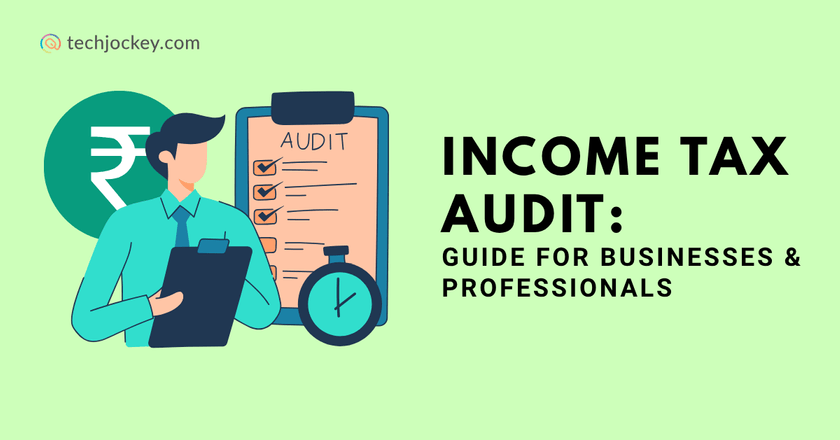What is Income Tax Audit? Format, Objectives & Turnover Limits

Business may be exciting, but when it comes to taxes, even a small slip can turn into a big headache. And and and…. if you are an Indian business owner, dealing with income tax is another big task!
But you have to stay on the right side of the Income Tax Act to keep your business compliant. And one term that often sends shivers down the spine of many business owners is income tax audit.
This blog will break down everything about income tax audit:
- Who needs it?
- What’s the turnover limit for tax audit?
- Income tax audit due date
- Penalties and more
Let’s jump in.
What is Income Tax Audit?
In simple terms, an income tax audit is going through your books of accounts as per the Income Tax Act, 1961. As companies are subjected to statutory audit (under company law) or costs audit (under cost accounting law), so is it for some businesses and professionals to undergo their accounts audit for tax purposes.
A Chartered Accountant (CA) conducts this audit, reviewing the accounts and confirming that amounts of income, expenses, and deductions are properly reported. The audit also ensures that the taxpayer has complied with all provisions of the income tax law.
CA prepares the results in the prescribed formats, like Form 3CA/3CB and Form 3CD, and further uploads them electronically on the Income Tax portal. This is commonly known as an ITR audit since it directly assists in filing your Income Tax Return (ITR).
Objectives of Tax Audit
A tax audit has more than compliance objectives. The main objectives of tax audit include:
- It’s for proper maintenance of books of accounts and reflecting the actual financial situation of the taxpayer.
- To certify claims for deductions, exemptions, and expenses
- Finding any discrepancies or fraud
- Helping tax authorities to check the accuracy of income tax returns submitted.
- Saving taxpayers and assessing officers’ time by reducing routine checks.
Simply put, a tax audit builds trust and credibility in your financial reporting.
Tax Audit Applicability
Applicability of tax audit is based on the turnover limit of tax audit, and other particular conditions as per the Income Tax Act.
- For Businesses: In case the total sales, turnover, or gross receipts are more than INR 1 crore in a financial year, a tax audit is mandatory. But once a minimum of 95% of the transactions are digitized, then the turnover threshold is raised to INR 10 crores.
- For Professionals: In case gross receipts of the profession are over INR 50 lakh, a tax audit is necessary.
Under Presumptive Taxation Schemes:
- Section 44AD: In case a small business chooses presumptive taxation, and declares less profits than the rate prescribed, and the income is over the basic exemption threshold, an audit is mandatory.
- Section 44ADA: The same applies to professionals who are subject to presumptive taxation.
- Sections 44AE, 44BB, 44BBB: Audit applies in case the actual profits are reported below the presumptive income levels.
This implies that the minimum turnover of income tax audit is INR 1 crore in case of a business and INR 50 lakh in case of professionals, unless there are special conditions.
Types of Income Tax Audit
Although there are various forms of income tax audit, the standard audit is done under Section 44AB. The only difference is the form of the audit report that needs to be submitted:
- Form 3CA: This form is for businesses or professions under another law (such as a company under the Companies Act).
- Form 3CB: For those who are not required to undergo any other audit means they do not fall under any other law (standard form).
- Form 3CD: This is a detailed statement of particulars. It is required to be submitted along with the Form 3CA or 3CB always.
- Form 3CE: This will be applicable to special cases like non-residents receiving royalties or technical service fees in India.
- In short, audit is one, but the reporting format is different for different types of businesses and individuals. All these forms must be filed electronically by the Chartered Accountant on the Income Tax portal. Once uploaded, the taxpayer needs to log in and approve the report.
To make the process easier and more automated, a few CAs use income tax software. Most of the details are pre-filled, which saves time.
Income Tax Audit Procedure
The income tax audit process is fairly organized:
- Appointment of a Chartered Accountant: Only a practicing CA is allowed to perform the audit.
- Accounts Books Review: CA reviews ledgers, vouchers, purchase/sales, expenses claim, etc.
- Audit Report Preparation: CA prepares an audit report in the relevant form (3CA/3CB/3CD) based on the findings.
- Online Submission: CA uploads the report electronically on the income tax portal using his or her login credentials.
- Taxpayer Approval: The taxpayer should acknowledge the uploaded audit report using his/her own e-filing account.
This is done to provide accountability and transparency, which leaves an electronic trail of compliance.
Tax Audit Due Date
The due date of the tax audit usually matches the due date of ITR filing in audited cases. Traditionally, the due date is 30th September of the assessment year. But in the case of FY 2024-25 (AY 2025-26), the last date is decided as 31st October 2025. In the case of transfer pricing (international transactions), the due date is also the same, i.e., 31st October.
Penalty for Non-Compliance
According to Section 271B of the Income Tax Act, you can be penalized in case you do not have your accounts audited and submitted on time.
The penalty is around:
- 0.5% of the total sales/gross receipts/turnover, or
- INR 1,50,000
But in case you can show a reasonable cause (natural calamity, auditor resignation, loss of accounts through accident, or any other valid cause), the penalty can be waived.
Final Thoughts
Income tax audit might seem an unnecessary burden, but it is very crucial to maintain your financial records properly. Knowing everything from income tax audit rules to applicability and due date can help you avoid penalties and maintain a good relationship with tax authorities.
Overall, income tax audit is not only about compliance, but also about maintaining transparency in financial records, thus creating a credible financial base for your business.
FAQs on Income Tax Audit
What is income tax audit in India?
An income tax audit is reviewing the books of accounts by a Chartered Accountant to ensure that everything is filed correctly. It’s done under Section 44AB of the Income Tax Act.
What is the minimum turnover for income tax audit?
INR 1 crore for businesses (or INR 10 crores if 95%+ transactions are digital) and INR 50 lakh for professionals.
What is income tax audit format?
The audit report is filed in prescribed forms – Form 3CA/3CB and Form 3CD. In some cases, Form 3CE is also applicable.
What is the tax audit due date for FY 2024-25?
The last date for tax audit for the financial year 2024-25 is 31st October 2025.
Is tax audit compulsory for all businesses?
No. It is only required by the businesses that cross turnover thresholds or come under specific conditions of the Income Tax Act.
What happens if I don’t get my tax audit done?
You might have to pay fines as per Section 271B. The penalty could be up to INR 1.5 lakh, unless you provide a reasonable cause for the tax audit not being done.
How much does a CA charge for a tax audit?
There are no fixed charges for a CA audit. It totally depends on the business size, volume of transactions, and complexity of accounts. It could range from INR 10,000 to INR 25,000 for a small business. However, for large businesses, the charges could be higher.
Mehlika Bathla is a passionate content writer who turns complex tech ideas into simple words. For over 4 years in the tech industry, she has crafted helpful content like technical documentation, user guides, UX content, website content, social media copies, and SEO-driven blogs. She is highly skilled in... Read more




























